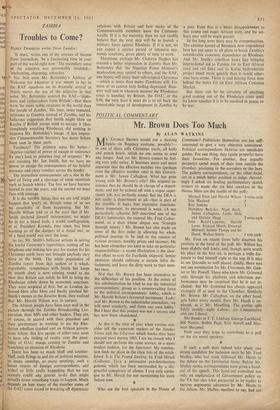ZAMBIA
Troubles to Come?
HARRY FRANKLIN writes from Lusaka : 'It must,' writes one of my sources of income from journalism, 'be a fascinating time in your part of the world right now.' The secondary sense of the adjective was presumably intended= 'enchanting, charming, attractive.'
No. Not even Mr. Bottomley's Address of Welcome (or whatever it was meant to be) to the RAF squadron on its dramatic arrival at Ndola merits the use of the adjective in that sense.' Mr.,Boitomley assured the RAF—'diplo- mats and arithaSsadors from Britain'—that there were 'no more noble creatures in the world than the people of Zambia.' His later, twice repeated, reference to Gambia instead of Zambia, and his ludicrous suggestion that Smith might blow up Kariba if British troops tried to occupy it (thus :ompletely wrecking Rhodesia), did nothing to improve Mr. Bottomley's image. A less impres- ;lye Commonwealth Secretary has never before been seen in these parts.
Fascinate? The primary sense fits better-
. deprive (victim) of power of escape or resistance by by one's look or presence (esp. of serpents).' We are resisting. Mr. Ian Smith, but we have no power to escape the consequences of his baleful st presence and crazy conduct across the border. The immediate consequences are a rise in the cost of living and a shortage of some essentials de such as Scotch whisky. The first we have become Inured to over the years, and the second we must ly
face with courage.
It is• the terrible .things that we are told might
happen that worry, us, though some of us see no
ed possibility of them happening. But Mr. he Harold Wilson told us at the start that if Mr. Smith declared himself independent, we might nd he in for a blood bath, a world conflagration, et al. President. Kaunda, ever since, has been ia
warning us of the dangers of a racial war, or en of a third world war:over the issue.
So far, Mr. Smith's bellicose actions in seizing the lawful Governor's typewriters, cutting off his telephone and making him pay for stamps for his Christmas cards have not brought anybody very close to the brink. The white population of Zambia (apart from tkat section of it which, regrettably, sympathises with Smith but keeps its mouth shut) is now coming round to the view that Britain can safely be left to bring the
t) Rhodesian rebels down by economic sanctions. They were sceptical at first, but as London de- livered blow after blow and finally pinched Mr. Smith's money in, the Reserve Bank, they realised that Mr. Harold Wilson was in earnest.
The African people have been kept well in the picture through the Zambia Broadcasting Cor- poration, their MPs and other leaders. They are, of course, in accord with their president and their government in wanting to see the Rho- desian rebellion crushed and an African govern- ment follow. But few people of either race seem to have any feeling of reality over the possi- bility of OAU troops coming to Zambia and
launching an invasion Of Rhodesia. •
There has been so much bluff and counter- bluff, such flyings to and fro of political missions, so many speeches, so many meetings, such a locust swarm of foreign correspondents, and withal so little really happening that we can scarcely credit any, greater to-do that might actually cause something tragic to happen. Much depends on how many of the member states of the OAU come round to breaking off diplomatic relations with Britain and how many of the Commonwealth members leave the Common- . wealth. If it is the majority, then we can readily believe that the next step will be to launch a military force against Rhodesia. If it is not, we can expect a quieter period of intensive eco- nomic sanctions, given plenty of time to work.
Meantime, perhaps Mr. Cledwyn Hughes has created a better impression in Zambia than. Mr. Bottomley did; the Nigerian Prime Minister's moderation may spread to others, and the RAF, one hopes, will enjoy their sub-tropical Christmas —which is more than many Zambians will. For most of us cannot help feeling depressed. How- ever well and in whatever manner the Rhodesian crisis is handled, by Britain, the OAL1, or the UN, the very least it must do is to set back the remarkable surge of development in Zambia by
a year. Even that is a bitter disappointment to this young and eager African state, and the set- back may well be much greater.
In the long term there may be compensations. The extreme hatred of Rhodesia now engendered here has put spurs to all plans to break Zambia's considerable economic dependence on Rhodesia. And Mr. Smith's rebellion looks like bringing international aid to Zambia for its East African road and rail links and its Kafue hydroelectric project much more quickly than it would other- wise have come. There is real driving force now behind the move for an East African Common Market. But there can be no certainty of anything good coming out of the Rhodesian crisis until we know whether it is to be resolved in peace, or by war.






























 Previous page
Previous page